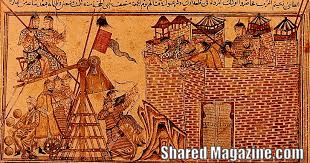The Siege of Bukhara: A Historic Tale of Conquest and Resistance
Introduction
The Siege of Bukhara stands as a testament to the tumultuous history of Central Asia, characterized by conquests, power struggles, and resilient resistance. In this article, we delve into the events surrounding this significant siege, exploring its historical context, strategic intricacies, and lasting impact on the region.
Historical Background
Bukhara, renowned for its strategic location along the Silk Road, has long been a hub of trade, culture, and political influence in Central Asia. Its coveted position attracted the attention of numerous empires throughout history, from the Arab caliphates to the Mongol hordes.
Siege Tactics Siege of Bukhara
When besieging Bukhara, various tactics were employed by the invading forces to overcome its formidable defenses. These tactics ranged from conventional siege warfare to psychological warfare aimed at demoralizing the defenders.
Resistance from Bukhara
Despite facing overwhelming odds, the defenders of Bukhara exhibited remarkable resilience and ingenuity in thwarting the enemy’s advances. They erected formidable fortifications and employed guerrilla tactics to prolong the siege.
Duration and Outcome
The Siege of Bukhara endured for months, exacting a heavy toll on both the besiegers and the besieged. Ultimately, the outcome of the siege would reshape the political landscape of Central Asia for years to come.
Aftermath
The aftermath of the siege left Bukhara scarred but unbowed. The city’s resilience in the face of adversity became legendary, inspiring future generations to stand firm in the face of tyranny.
Impact on Central Asia
The Siege of Bukhara had far-reaching consequences for the region, triggering power shifts and reshaping alliances among neighboring states. Its echoes reverberated across Central Asia for centuries.
Legacy
Today, the Siege of Bukhara is remembered as a defining moment in the history of Central Asia, symbolizing the enduring spirit of resistance against foreign aggression.
Analysis of Historical Accounts
Historical accounts of the Siege of Bukhara vary, reflecting the biases and perspectives of the chroniclers. Scholars continue to debate the nuances of the siege, offering diverse interpretations of its significance.
Modern Significance
Despite being relegated to the annals of history, the Siege of Bukhara remains relevant in modern times, serving as a cautionary tale against imperial ambitions and the devastating consequences of war.
Lessons Learned
The Siege of Bukhara offers valuable lessons for contemporary society, highlighting the importance of diplomacy, resilience, and unity in the face of adversity.
Historical Importance
Bukhara’s pivotal role in shaping the course of Central Asian history cannot be overstated. Its rich cultural heritage and strategic significance continue to captivate scholars and enthusiasts alike.
Cultural Impact
The Siege of Bukhara left an indelible mark on the cultural fabric of the region, inspiring works of art, literature, and folklore that celebrate the city’s enduring spirit.
Historiographical Studies
Academic research on the Siege of Bukhara continues to evolve, with scholars employing interdisciplinary approaches to unravel its complexities and shed new light on this pivotal event.
Conclusion
In conclusion, the Siege of Bukhara stands as a testament to the resilience of the human spirit and the enduring legacy of those who dared to defy the odds. Its lessons continue to resonate in the modern world, reminding us of the importance of courage, perseverance, and solidarity in the face of adversity.
FAQs
Was the Siege of Bukhara a turning point in Central Asian history?
Yes, the siege marked a significant shift in power dynamics and alliances in the region.
How long did the Siege of Bukhara last?
The siege lasted for several months, exacting a heavy toll on both sides.
What were some of the tactics employed by the besieging forces?
The besiegers utilized a combination of conventional siege warfare and psychological tactics to undermine the defenders’ morale.
What was the cultural impact of the Siege of Bukhara?
The siege inspired numerous works of art, literature, and folklore that celebrated the city’s resilience and defiance.
How is the Siege of Bukhara remembered today?
The siege is commemorated as a pivotal moment in Central Asian history, symbolizing the enduring spirit of resistance against foreign aggression.



